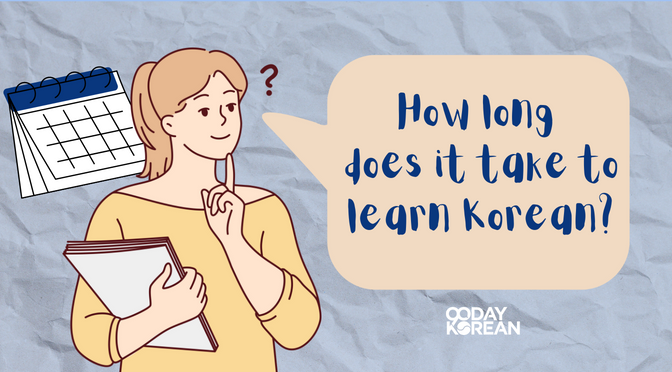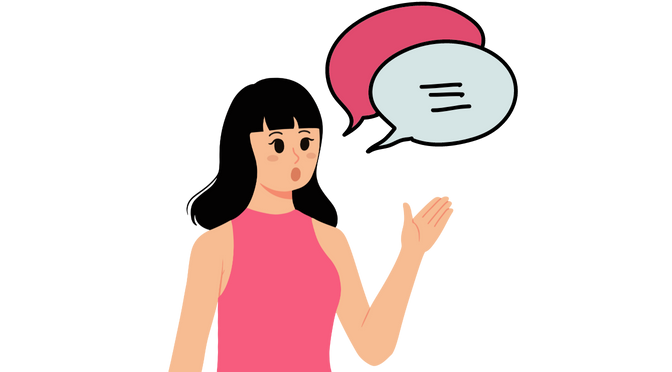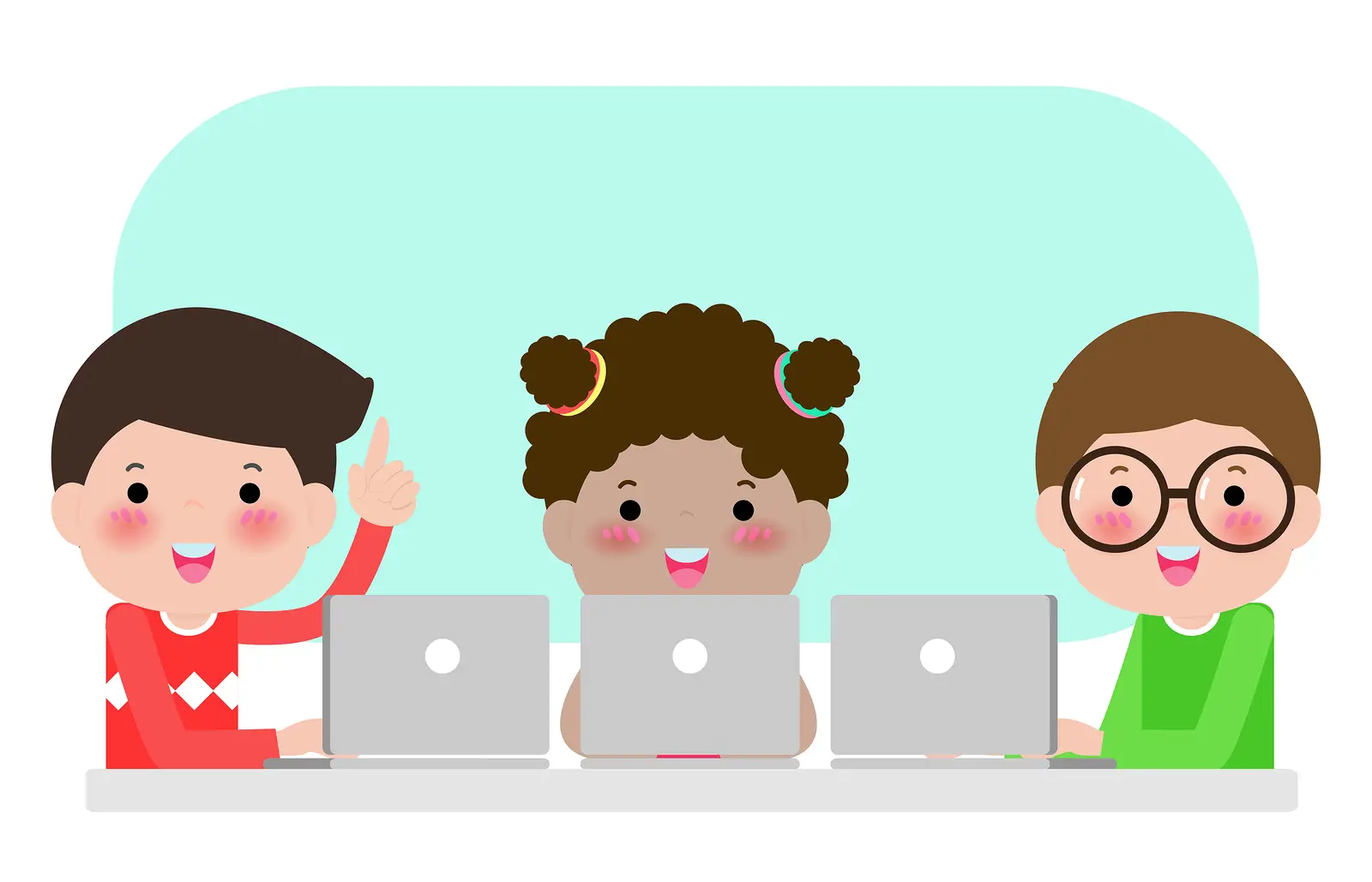Whether you want to learn Korean or are already learning, the question “How long does it take to learn Korean?” has likely popped up in your mind.
It’s understandably an important question for you to ask. After all, it influences your decision to learn Korean or not. Like many other foreign languages, the Korean language is good to learn and work towards being fluent in if you want to visit or live in South Korea.
It’s also worth putting in some study hours if you are interested in K-Pop, K-Dramas, Korean movies, or Korean culture.
However, it’s important to consider that it’s an entirely new alphabet, and the language is mostly spoken in South Korea. So is it worth the time investment? In this article, we’re going to tell you what you need to know about how long it takes to learn Korean so you can make your decision to start learning Korean.
Let’s get to know the learning process!
Below is a free PDF guide for “How long does it take to learn Korean?” that you can download and take with you:
Contents
- 1 How long does it take to learn a language like Korean?
- 2 How many hours a day should you study Korean?
- 3 How many hours a week should I study Korean?
- 4 How long does it take to learn Korean fluently?
- 5 Things to consider in learning the Korean language
- 6 Other factors that affect how long it takes to learn Korean
- 7 The Fastest Ways to Learn Korean
- 8 Wrap Up
How long does it take to learn a language like Korean?
It takes three months (90 days) to learn enough Korean to have a 3-minute conversation in Korean if you study for 7-10 hours per week. After one year of studying at this pace, you can become conversationally fluent.
However, we will give you some ballpark estimates for how long it takes to learn Korean. Then, you can adjust to your own situation.
How many hours a day should you study Korean?
This is really a personal call and depends greatly on your goals and timelines. If you’re studying part-time or as a hobby, a good target to start with is 1 hour a day, and then make adjustments as you go. Keep in mind that you will likely be more excited and motivated to study at the start. The real test comes when you don’t feel like studying.
In those cases, we usually recommend adjusting your study time. You may also want to come up with a small minimum to do each day, even if it’s only 5 minutes. That way, you still get some practice in, but also leave yourself open to study more when you’re motivated.
If you’re studying as a full-time student, you should aim for about 4-7 hours of study per day.
Get “How long does it take to learn Korean?” Free PDF Guide
How many hours a week should I study Korean?
For part-time students or if you’re studying for fun, then make a goal of 5-8 hours per week. Then, make adjustments as you go. You can always add more to it, but make sure you’re keeping at a comfortable pace.
If you’re a full-time Korean student, 20-25 hours per week is a good target.
How long does it take to learn Korean fluently?
It will take about 1200 hours to reach a high intermediate level. You’ll need additional practice, so you may want to double that number to 2400 hours to get towards fluency. That would be about 23 hours of study per week for two years.
If you’re curious about the word “fluent” in Korean, here’s an article that will teach you how to say it.
Get “How long does it take to learn Korean?” Free PDF Guide
Things to consider in learning the Korean language
Learning something new, like learning languages, depends on the learner and other different factors. Similarly, the Korean learning experience varies among people, so it isn’t easy to give a specific numeral timeline on how long it may take for someone to learn the language. Below are some things to consider, and we’ll go over how much each step of Korean language learning approximately takes.
How long does learning the Korean alphabet take?
With our Hangeul lesson, learning Hangul will be as quick as 60 to 90 minutes! This will teach you the basics of Korean characters, including vowels and consonants, so you can read most words. You will be able to start sounding out words, phrases, and sentences right away. Naturally, you will start off with a slow pace, but once you get the hang of it, you will want to practice reading Korean faster.
As you start learning Hangeul and get more accustomed to using it, you’ll also enjoy the reading process. You’ll find yourself more comfortable reading Korean words, which will help you improve your learning of Korean vocabulary.
You’ll want to get a solid handle on Hangeul, so plan to spend another 30 minutes per day for the first week on it. Flashcards such as Anki are great for this. By the end of the first week, you’ll have a strong command of the alphabet.
Now that we have the first few hours covered let’s dive into learning vocabulary, grammar, and sentence structure.
How long does it take to speak Korean?
If you spend about 1-2 hours per day studying Korean, you should be able to have a 3-minute conversation in the first 90 days (about 3 months). To do this, make sure you pick the right materials and focus on the parts of the language that will give you the best results. Otherwise, you may waste months or years learning things you rarely use.
In other words, if you want to improve in spoken Korean, focus on the Korean words, grammar, and phrases that are used most often. In other words, follow the 80/20 rule of focusing on the 20% of the language that will give you 80% of the results. Skip the specialty words and the extra formality for later.
This is exactly how our Inner Circle online structured Korean language program is designed. You get the most useful grammar, words, and phrases to help you speak from the very beginning.
There are many excellent courses and resources out there. Just make sure you pick one that will support you in hitting your goals on your desired timeline, which should take about three months to get the basics down.
How long does it take to become conversationally fluent in Korean?
You should be able to have conversational fluency in less than a year. Again, you want to follow the parts of the Korean language that are used most often. By the time you can have a 3-minute conversation in Korean, you can start to direct the focus of your studies. Then, you can talk to people in Korean in the situations that interest you most.
For example, if you want to talk to Korean in-laws, then you’ll want to learn Korean honorifics and use them more often. You can put more exclamations or slang into your vocabulary if you’re talking with Korean friends. And if you’re a Korean drama fan, you’ll want to focus on listening to basic conversations so you can watch Korean dramas without subtitles.
You could define Korean fluency as roughly being at an intermediate level. However, it all depends on your goals and what kind of Korean language skills are most important to you, may it be reading skills, writing skills, etc.
Get “How long does it take to learn Korean?” Free PDF Guide
Other factors that affect how long it takes to learn Korean
Below, we have separated some of the different factors that affect how quickly you can learn Korean. These are also relative to just how fluent in Korean you want to become!
1. Your native language
Depending on what native language you speak, learning Korean might be just a little bit easier or a little bit tougher for you. For example, Korean is considered especially difficult for native English speakers to become fluent in.
Meanwhile, for speakers of other East Asian languages, such as Japanese, Chinese, and Arabic speakers, Korean can be an easy language to learn. It could take far few hours (or years!) to become fluent at the same level as a native English speaker.
Don’t worry, though! Your native language may slow you down a little bit, but it isn’t an obstacle you cannot overcome! For example, you can use associations in your native language for Korean words you want to learn.
2. Your previous language learning experience
Language learners are at an advantage in learning a new foreign language if they were raised using a second language or have the ability to speak a foreign language. Having developed fluency with speaking more than one language as a child over the years has made you naturally more adjustable to learning a new language.
Your brain will have already adjusted to the type of learning that studying a new language follows. Thus, you’ll have an easier time learning Korean as well. This is especially so if you’re adept at learning new languages!
3. The learning methods you are using
Learning Korean in a classroom setting is the best way to get clear information on grammar structures. It will also give you a well-thought-out plan to follow for learning vocabulary. However, if you aren’t learning, practicing, or applying the Korean you learned in situations outside of the classroom, then your progress will be slower.
Instead of just focusing on getting the minimal homework done, try actively watching K-dramas and Korean movies to help with your Korean vocabulary or listening to K-pop songs to start. You can then practice through apps or language exchanges, talk with native speakers, and use eBooks or textbooks and Korean learning websites. You can try these to help develop your skills and achieve language proficiency faster.
If you have the chance, traveling to Korea to attend language school is the absolute quickest way to learn Korean and become fluent in Korean.
Get “How long does it take to learn Korean?” Free PDF Guide
4. How much of your time you are dedicating to learning Korean
The more hours you spend each day studying Korean, the quicker you can grow your fluency. Your time dedication is also connected to your general language learning ability and learning methods.
For example, you may be learning new Korean nouns or Korean vocabulary daily. Spending more time reviewing this material is going to help you become more familiar with it.
If you know your pace of studying and the results it gets you, you can calculate how much you will improve if you adjust your study time. Using calculations like this will be helpful if you want to measure how long it might take you to learn Korean at your desired level. The more time you spend learning a language, the faster you’ll have language proficiency.
5. Your attitude and motivation toward learning Korean
It’s no secret that these two are the key to unlocking your language learning potential. Having a positive attitude toward learning Korean can help you stay highly motivated.
Your motivation is what keeps you studying, day after day, even on the days when you’re feeling frustrated because you are working on some challenging new grammar. Do you want to know why learning Korean is fun? Find out here.
Get “How long does it take to learn Korean?” Free PDF Guide
The Fastest Ways to Learn Korean
The quickest and best way to learn Korean is to be around the language as much as possible. There are many ways to accomplish this, so we’ll give you suggestions.
Attend language schools in Korea
One option for this language learning is moving to Korea and attending a language school here. In these Korean language schools, starting from the bottom, you will typically study through 6 levels, with four levels a year. That would take you 1.5 years from the basics to graduating from the program.
Each level lasts for ten weeks and includes 20 hours of classes per week. That means it will take 1200 hours in total to learn Korean using this method. This estimate of hours does not include homework and time spent outside of class practicing your skills.
Learn Korean online
A second option is to learn Korean online. You could do this by joining an online Korean language learning program, or studying through online courses. Alternatively, you can create your own program with various online resources.
In either case, you can use the 1200 hours as a basis for how long it takes to learn Korean at a high intermediate level. How many hours a week are you prepared to study? When you know your weekly amount, you can have an estimation for reaching the milestone of Korean fluency. Take your time, and make sure you enjoy the learning process.
Wrap Up
We hope this was helpful. We look forward to hearing how you’ll enjoy Korean movies and music and the Korean culture better as you learn Korean, too! Let us know how far you are with your Korean studies in the comments below!
Get “How long does it take to learn Korean?” Free PDF Guide









After having read this article, I’m convinced now more than ever to try to take private classes or tutorials- 8 hours, Monday to Friday, equivalent to 40 hours per week to speed up the learning process in order to be able to take TOPIK 6 in no time.
Sounds like a good plan. ^^ We wish you good luck in your learning journey!